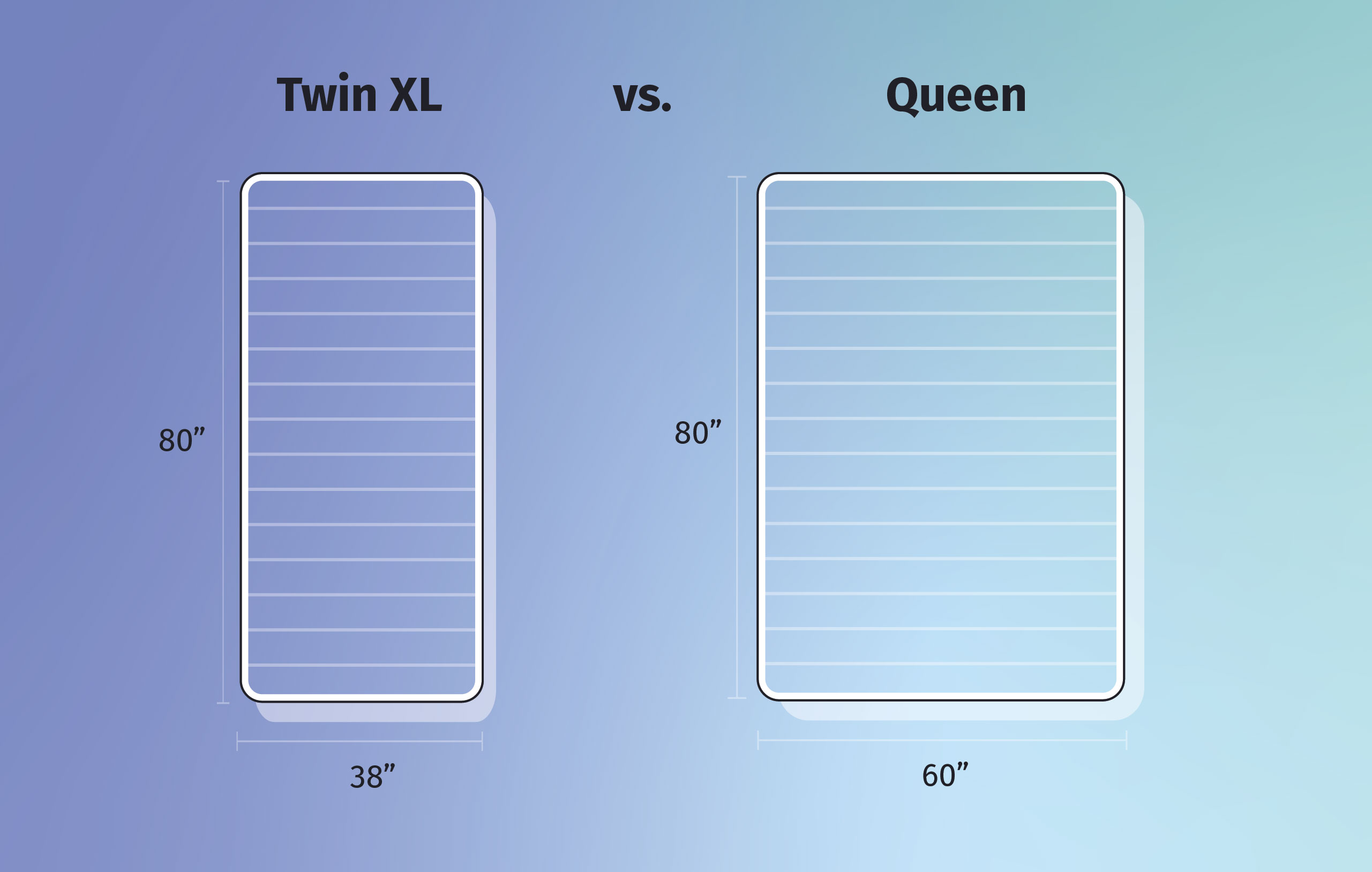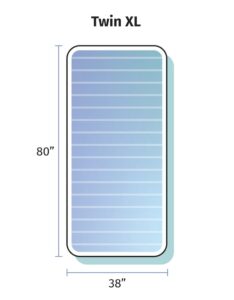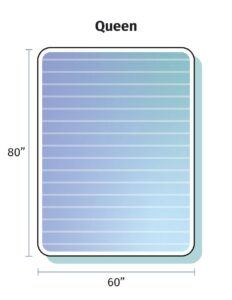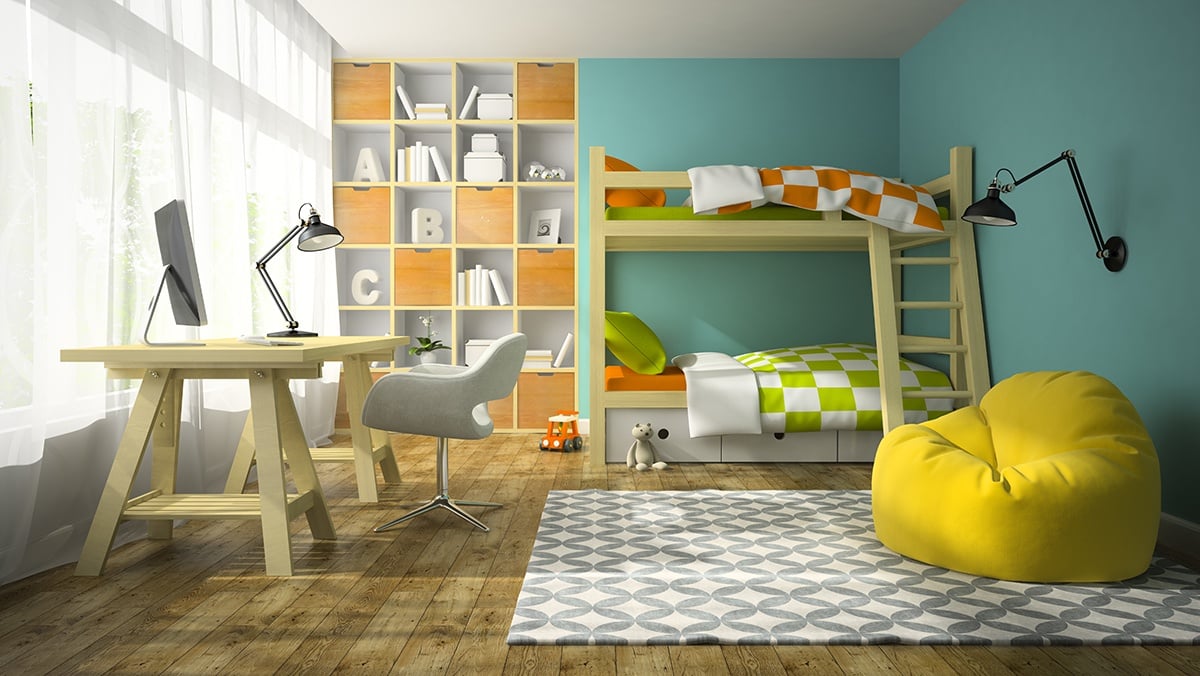It’s quite easy to see that there is a significant size difference between a Twin XL and a Queen bed – about 22″ in width – the Twin is much better suited for individuals, and people will often see them in children’s rooms or college dorm rooms. The Queen requires more space but will work particularly well for couples and those who need more room. To find out everything there is to know about these two types of beds, read on for our full comparison!
Jump To
Twin XL vs. Queen | Twin XL Overview | Queen-Size Bed Overview | Which Size Is Best for You? | Additional Considerations
Twin XL vs. Queen Mattress Comparison
For a quick summary of the differences between a Twin XL and Queen bed, check out our comparison chart below.
| Criteria | Twin XL Mattress | Queen Mattress |
| Size | 38″ x 80″ | 60″ x 80″ |
| Best for | Kids, college students, budget shoppers | Individuals who want a lot of space, couples |
| Price | $400 – $700 | $800 – $1,700 |
| Ideal room | Children’s bedrooms, smaller bedrooms, college dorms | Master bedrooms, guest rooms |
| Pros | Cheaper than a Queen-size bed, easy to find accessories for, easily fits taller individuals and children | Comfortably fits couples, easy to find accessories for |
| Cons | Too small for couples, smaller than a Queen-size mattress | More expensive, more difficult to move |

Twin XL Mattress
The Twin XL is the same width as a Standard Twin but it’s approximately 5″ longer, making it the same length as a Queen or King – it is a fantastic option for college dormitories or taller children who may have smaller bedrooms but have outgrown their crib.

| Width | 38″ |
| Length | 80″ |
Pros
- More affordable than most other mattress sizes
- Great for growing children
- Good option for college dormitories
- Fits in small spaces
- Easy to find accessories for
- Comfortably fits taller individuals
Cons
- Does not fit two individuals
- Smaller than most other mattress sizes
Additional Twin Mattress Sizes
Twin: A Standard Twin is also known as a Single bed and is often the next step for children who have outgrown their cribs; they’re also a fantastic option for smaller bedrooms and make a good mattress for a guest room. Bunk beds also traditionally come in Twin size.
RELATED: Best Twin-Size Mattresses
| Width | 38″ |
| Length | 75″ |
Queen-Size Mattress
A Queen-size bed is 5” longer and 6” wider than a Full-size mattress – Queen beds are suited for both couples and individuals because each couple gets about 30” of space to themselves. Because it can work for either a single person or a couple, it is the most popular mattress size today – it is often a particularly good fit for master bedrooms or guest rooms.

| Width | 60″ |
| Length | 80″ |
| Width Per Person | 30″ |
Pros
- Comfortably fits two individuals
- Provides more space than many other size options
- Easy to find accessories for
- Fits large and small master bedrooms
Cons
- More expensive
- More difficult to move
Additional Queen Mattress Sizes
Olympic Queen (or Expanded Queen): The Olympic Queen is a full 6″ wider than a Standard Queen but has the same length (80″), making it a fantastic fit for couples.
| Width | 66″ |
| Length | 80″ |
California Queen: California Queens are waterbed mattresses and particularly difficult to find these days; customers might have to go back in time to find one.
| Width | 60″ |
| Length | 84″ |
Split Queen: This is essentially a Queen bed but it is split right down the middle; it is also an exceptional option for couples.
| Width | 30″ (each half) |
| Length | 80″ |
Blend Images/Shutterstock
RELATED: Best Mattresses for Couples
Which Size Is the Best?
Twin XL Beds Might Be A Good Fit For …
- People who require a bed for a smaller individual or child. While both the Twin XL and the Queen have the same length (80″) the Twin XL is only 38″ wide, which makes it fairly narrow and a particularly better fit for smaller adults or children who have outgrown their crib.
- People who are working with a tight bedroom space. The Twin XL is a popular bed for college dorm rooms, where space is limited and there are usually at least two young adults in each room; they can be lofted as well, and their extended length helps taller students fit in the bed. Twin or Twin XL beds are also stacked on top of each other like bunk beds in children’s rooms as well.
- Those who are looking to save some money on their purchase. There are so many mattress and bed brands on the market that it’s quite difficult to say exactly how much money people will save – however, going with a Twin XL (or even a Twin) over a Full/Double or a Queen will save them money – shoppers should keep their eye on bedding sets close to Back-To-School time and Labor Day weekend as a Twin XL bed is particularly popular for kids and students and will most likely be on sale.
RELATED: Best Cheap Mattresses
Queen Beds Might Be A Good Fit For …
- Those who sleep with a partner. In a Queen-size bed, each person gets roughly 30″ of space, making it more comfortable than a Full/Double for couples. It would be nearly impossible for a couple to split a Twin bed – they’d only get 19″ of space each.
- People who are purchasing a bed for a master bedroom. Master bedrooms tend to be larger than guest rooms – Queen beds tend to fit both rooms well, which makes them super popular – larger Master Bedrooms may benefit from a bigger bed like a Queen (or even a King).
- Those who have a bigger mattress budget. Not surprisingly, a Queen bed with mattress, matching sheets, mattress protector (yes, people will want one) and additional accessories will all cost shoppers more as they move to a bigger size – it’s wise not to blow one’s whole budget on a new bed and forget that it is necessary to keep it protected and comfortable.
 Koksharov Dmitry/ Shutterstock
Koksharov Dmitry/ Shutterstock
Other Things To Consider
People may be eyeing a Queen-sized bed or hoping to save space (and money) by going with a Twin XL. Either way, doing solid research in advance – measuring and planning out the bedroom space – will ensure that one’s final choice will be the absolute best bed.
- Measure the bedroom space and leave room for movement. If people are thinking about making the jump from a Twin XL to a Queen-sized bed, they should check to make sure it fits it in their bedroom; yes, this may seem obvious, but it’s easy to get caught up in an impulsive shopping moment and end up with a bed that doesn’t necessarily fit. An article from Thingz Contemporary Living reports that most designers will recommend 30″ of space around the bed for easy movement.
- Make sure it is easy to maneuver the new bed into the bedroom. Without a doubt, the Twin XL bed and mattress will be easier to move than a Queen bed. Even if someone thinks they can handle it themselves – it may be smart to ask for help when moving furniture – Queen-sized mattresses (especially heavier foam ones) may require the help of two people to move.
- Shop around Back-To-School time. There are times during the year that mattresses and beds will go on sale – if someone is on a budget but wants to upgrade to a bigger bed, it might be worth waiting to make a purchase during that time – for mattresses, Labor Day weekend is often a fantastic time for sales.
Overall
Choosing between a Twin XL and a Queen will come down to space and budget; Queens will most likely be a particularly better fit for a decent-sized master bedroom but cost more and a Twin (or Twin XL for extra length) could be the perfect size for a cozy dorm room or child’s room and come at a significantly more affordable price.
Featured image: Kristi Blokhin/Shutterstock

